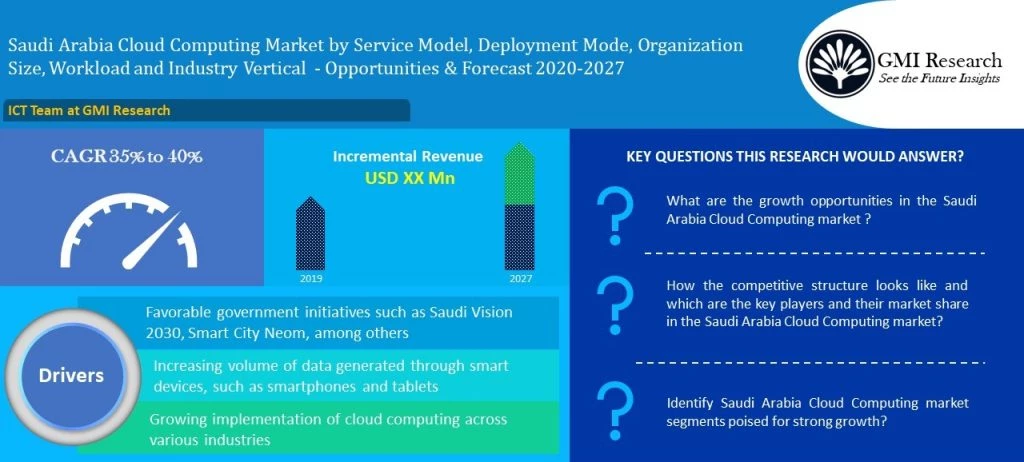Press Release
As per the GMI Research, the accelerating adoption of cloud computing services in various industry verticals such as BFSI, ICT, government & public sector and retail and the growing need for cloud computing services by the small and medium enterprises in the country are some of the major factor fuelling the growth of the Saudi Arabia Cloud Computing Market. The market was estimated to be USD xx Million in 2019 and is predicted to reach USD xx Million by the end of 2027, while growing at a CAGR of 35% to 40% during the forecast period (2020-2027).
Favourable government initiatives supporting digitization and cloud adoption which include the Saudi Vision 2030, Cloud First Policy stands to be primary factor that is expected to surge cloud adoption by large and SMEs in the country. The government of KSA launched the Cloud First Policy under Saudi Vision 2030 covering governmental entities, which aims at accelerating the implementation of cloud computing services of these entities when making new IT investment decisions. Furthermore, increasing volume of data generated through smart devices, such as smartphones and tablets among others has subsequently created the requirement for adoption cloud storage solutions. Cloud computing has several benefits in mobiles and tablets, which include smoother exchange of data, multiple platform support to run your applications, data availability at all times, cost-efficiency, data back-up, and data recovery. Various cloud service providers have been investing in their research & development activities for the enhancement of mobile cloud computing solutions. For instance, IBM launched IBM Bluemix, which is a platform for cloud-based mobile applications, application authentication, push notifications, and data and file storage.
To have an edge over the competition by knowing the market dynamics and current trends of “Saudi Arabia Cloud Computing Market”, request for Sample Report here
Furthermore, strategic initiatives and the launch of data centers in the country by the leading players are further surging market growth. In 2020, Dubai-based cloud and managed IT services provider, Bios Middle East has established two new cloud data centers in Saudi Arabia. The two new cloud zones aim to enable enterprises in the Kingdom to store all their data within the borders of the country. Similarly, in 2020, Google partnered with Saudi Aramco to bring cloud-computing services to Saudi Arabia. The partnership gave Alphabet Inc.’s Google regulatory clearance to set up a cloud region in the Kingdom.
However, factors such as data security concerns and lack of skilled work force acts as a restraining factor in the growth of cloud adoption.
On the basis of industry vertical, the BFSI segment is expected to grow at a high CAGR during the forecast period. Saudi Arabia is home to more than 27% of the GCC’s total banking assets and has the second largest banking industry in this region in terms of assets. BFSI industry experiences various benefits by adopting cloud computing solutions, which include augmented management, scalability, feasibility, stability, and cost efficiency. Cloud computing reduces capital expenses and huge upfront infrastructure costs.
Key Developments:
-
- In 2021, Microsoft Corporation signed an agreement with Mobily Business. The agreement aims to offer Microsoft Cloud services and productivity tools over the internet, which include Office 365, Enterprise Security Suite, Dynamics, in order to fulfil the needs of small and medium enterprises (SME) in the Saudi market.
- In 2020, IBM announced the opening of its first Security Operations Center in the Kingdom of Saudi Arabia to offer managed security services to private and public sector customers. IBM would also provide clients managed security services that are built for scale and efficiency to help protect hybrid cloud environments.
The Saudi Arabia Cloud Computing market is segmented into service model, deployment model, organization size, application and end-use industry. Based on the service model, the market has been segmented into Infrastructure as a Service, Platform as a Service, Software as a Service. Based on the Deployment Model, the market has been segmented into Public Cloud, Private Cloud and Hybrid Cloud. Based on the organization size, the market has been segmented into Small and Medium Enterprises and Large Enterprises. Based on the application, the market has been segmented into Storage, Backup, and Disaster Recovery, Application Development and Testing, Database Management, Business Analytics, Integration and Orchestration, Enterprise Resource Management, Collaboration and Content Management. Based on End-Use Industry, the market has been segmented into Manufacturing, Healthcare and Life Sciences, IT & Telecom, Retail and Consumer Goods, Energy and Utilities, Media and Entertainment, BFSI, Government and Public Sector.

